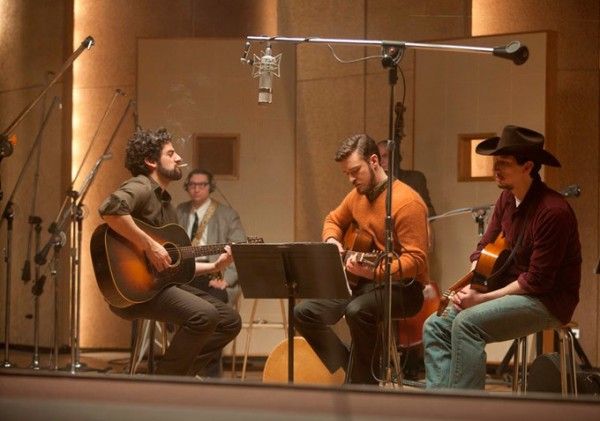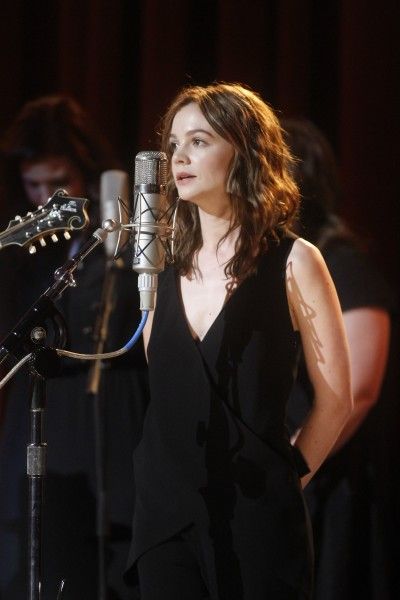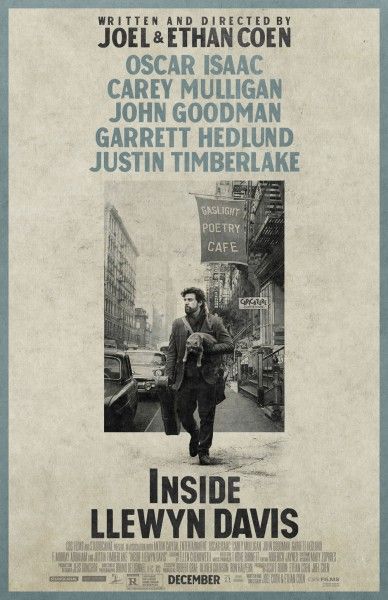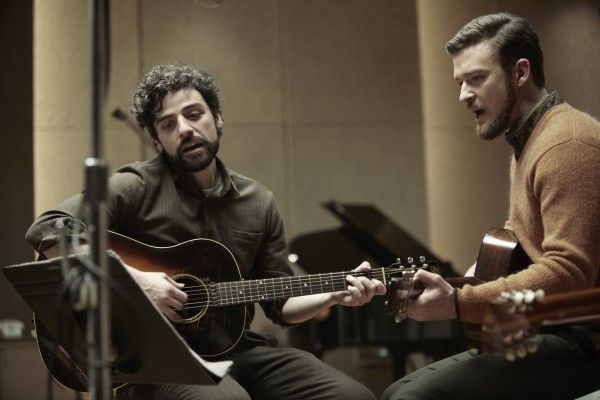From Academy Award winners Joel and Ethan Coen, Inside Llewyn Davis follows folk singer Llewyn Davis (Oscar Isaac), who is struggling to make it in the Greenwich Village folk scene of 1961. Relying on friends for a couch to sleep on and scrounging for whatever work he can find, Llewyn attempts to overcome seemingly insurmountable obstacles, many of which are of his own making, while never really catching a break. The film also stars Carey Mulligan, Justin Timberlake, John Goodman, Garrett Hedlund, F. Murray Abraham, Adam Driver, Stark Sands and Max Casella.
At the film’s press day, executive music producer T-Bone Burnett talked about how this project was presented to him, his relationship with this particular era of music, his lack of interest in popular culture, what earns his attention, how talented he thinks Justin Timberlake is, how they chose the music for the film, and the advice he would give young musicians. Check out what he had to say after the jump.
Question: How did the Coen brothers present this project to you?
T-BONE BURNETT: They called me. They have a very clear, simple view. What they said with this one was, “We want to do a movie about the Greenwich Village folk music scene in 1961, just before Dylan got there, and we want to do it with real songs, but made-up people, and we want to do it all live, with all live performances.” And that was it. That’s the foundation for the whole movie. That’s their pitch. They didn’t go in and give the history of The Civil War, or anything. I gave them that later.
What is your relationship with this particular era of music?
BURNETT: It probably was to me much like the O, Brother era of music was to kids in their early 20s and late teens today because it was about the same time. It wasn’t the soundtrack of my life, or anything like that, but it was around. At this period in time, this music would get on the radio because there was a scene developing. There was no scene, and then some troubadours went around and blazed some paths, and invented a scene that eventually became Elvis Presley, on one end of it, and then Bob Dylan on the other. So, there was Woody Guthrie and all those people doing that, and then Bob Dylan came through. He was in that line. Elvis was in another line, that didn’t have really access to Woody Guthrie. But, it was all the same music. It’s people with untrained voices singing music that grows right out of the ground. It’s music that’s been reinvented for hundreds of years. Music, for centuries and centuries, was used to teach everything. It was used to teach language, mathematics, history. The news was music. Everything traveled by song. It was used to teach ethics. It was used to create conscience, probably more than anything. Probably the deepest use of music and of art is to create conscience.
Since you work in the industry, do you know all music that’s out there? Do you have a huge breadth of knowledge, of all music?
BURNETT: No, I don’t. But, I get to hear the good stuff. I don’t hear any of the popular stuff unless it’s good ‘cause I pay no attention to popular culture, at all. I don’t have time. There’s too much of it, and there’s too much of it that has to do with people of no consequence, whatsoever. It’s just stuff that they run in front of you, to try to grab your attention. Why would you ever care? So, I don’t pay any attention to that. I live in my own world, I have to say. I live in my own little world.
What earns your attention, then?
BURNETT: A lot of it comes through that’s good. I’m not talking about the good music, ever. There’s always been an incredible amount of junk music, and junk everything. Marshall McLuhan said that a medium surrounds a previous medium, and turns the previous medium into an art form. So, what was once a junk culture, like film, television surrounded it and turned it into an art form. By the ‘70s, and even in the ‘60s, you had film as a full-blown art form with auteurs. And now, the internet has surrounded television and turned television into an art form where you have The Sopranos and The Wire and Breaking Bad. All of these things rise up out of it. But, there’s a lot more Storage Wars: Baltimore than there is Breaking Bad. I live in a community of wonderful people, who are smart and brilliant, and they tip me off. They say, “This is worth checking out.”
The song “Please Mr. Kennedy” reflects a junk culture of the time period in the movie, and then you’ve got pop star Justin Timberlake, who you’re fitting into that. How does all of that come together in your brain?
BURNETT: I don’t know. First of all, I love Justin Timberlake. I think he is about our best bet to be somebody like Bing Crosby, and to go all through his whole life and do great work. At times, he’s going to be more in favor, and at other times, he’ll be less in favor. You can’t take away from him how good he is. He’s just flat-out good, and he’s generous. He’s that rare thing where he will come in, and he doesn’t have to be a superstar. He just comes in as Justin. He’s from Memphis. He’s funny as hell, and he doesn’t mind making fun of himself. It’s just about generosity. It’s all about collaboration. The hallmark of an artist is generosity.
In a collaborative medium like this, everyone comes in and just puts everything on the table. To the degree everyone puts everything on the table, that’s how good the thing is. If everybody puts everything on the table, and one person wants to grab this part, then everything starts falling apart. So, when we’re in the studio, we don’t have the parts selected. It says, “Piano, guitar and drums.” t doesn’t say, “Billy or Johnny, or anything.” And we don’t let anybody say, “My guitar part.” People say, “The guitar part.” It’s our guitar part. You can’t get attached to a part that you’ll put down because what if somebody comes up with a better part? You just have to always be willing to know when the other guys are right. And Justin came in like that. He put everything on the table. He wasn’t holding anything back. We had seen him on Saturday Night Live, so we knew that he could be funny.
How did you choose which songs that you included? How do you find the right balance of songs that showcased this character’s talent, but also maybe why someone like him didn’t break through?
BURNETT: That was the tight-rope walk. I have to say that only people with the incredible skill and luck of the Coens could have pulled it off. I never dreamed we would do something like this. I saw the movie Once, and it wasn’t a great-looking movie because it was done on such a low budget. I saw it on a big screen, up close, and it was tough experience, but the music completely wiped everything away because it was real. It was live. It was two people that were really good, playing and singing a song, emotionally, for real, with no auto-tuning and no lip-syncing and no tricks. They were just doing it, for everything they had. Since then, I’ve held that as the standard. And Treme is the standard for a television show. The way they handled music in that was amazing. But, I didn’t ever think of doing that, myself.
First of all, I just didn’t think anyone would want to do that because the stakes usually are too high. When you’re doing Once, you’re doing it for low bucks, so you can afford to screw it up. And you’re also dealing with people who are professional musicians, too. Here, the tight-rope walk was that we had to find an actor who could play a difficult part of a character who is not trying to make you love him, and yet you still had to love him and stay with him, the whole movie. And it was about a musician, so we wanted whole performances of songs, in order to get into his real life as a musician, which is where you really learn the most about the character. And then, we had to do it live, documentary-style. So, we saw a lot of people, and I just thought it probably couldn’t happen. I thought we were going to have to find somebody and start lip-syncing, and do it the normal way, which would have been a completely different movie and it would have taken all the fun out of it, really.
The essence of show business is, if you see a tight-rope walker go across a tight rope, everybody claps. But, if you see him wobble, everybody gasps. Risk is what separates the artist from the artisan. We were like, “Okay, let’s take the biggest risk we can.” This is walking a tight rope without a net and without a rope. This is just levitating across the thing. And Oscar did it, and the Coens did it. I was sitting there with a stopwatch, making sure he wasn’t speeding up or slowing down. I had the most pedestrian job.
What advice would you give young musicians about how to overcome the times of frustration where you just hit a wall in your career?
BURNETT: My advice for young people is that, if you want to be a musician, the thing to do is practice eight hours a day. If you can practice four hours a day, that’s okay. And this sounds like bad advice, but it’s the most true, basic advice that I can give a musician. The second thing I would say is to let the business take care of itself. If you get involved in the business, every hour that you’re involved in business is an hour that you’re not practicing. And every hour that you’re not practicing is another hour further away from where you want to be. The business is changing so fast. Technology is changing so fast. Steve Jobs said, “Technology changes nothing.” I wouldn’t put any faith in technology to help you. I can tell you, for sure, the technologists have made it clear that they don’t care about musicians. The arts have been sacrificed on the altar of technological advancement. But that just forces the arts to be subversive, which they’ve always been. People make art on the sides of buildings, and they’ll make art on the sides of trains. They’ll make art wherever they decide to make art. The technology that people are working with now will be replaced in 10 years, so that’s not where your future is, if you’re a musician.
Inside Llewyn Davis opens in limited release on December 6th, and nationwide on December 20th.




